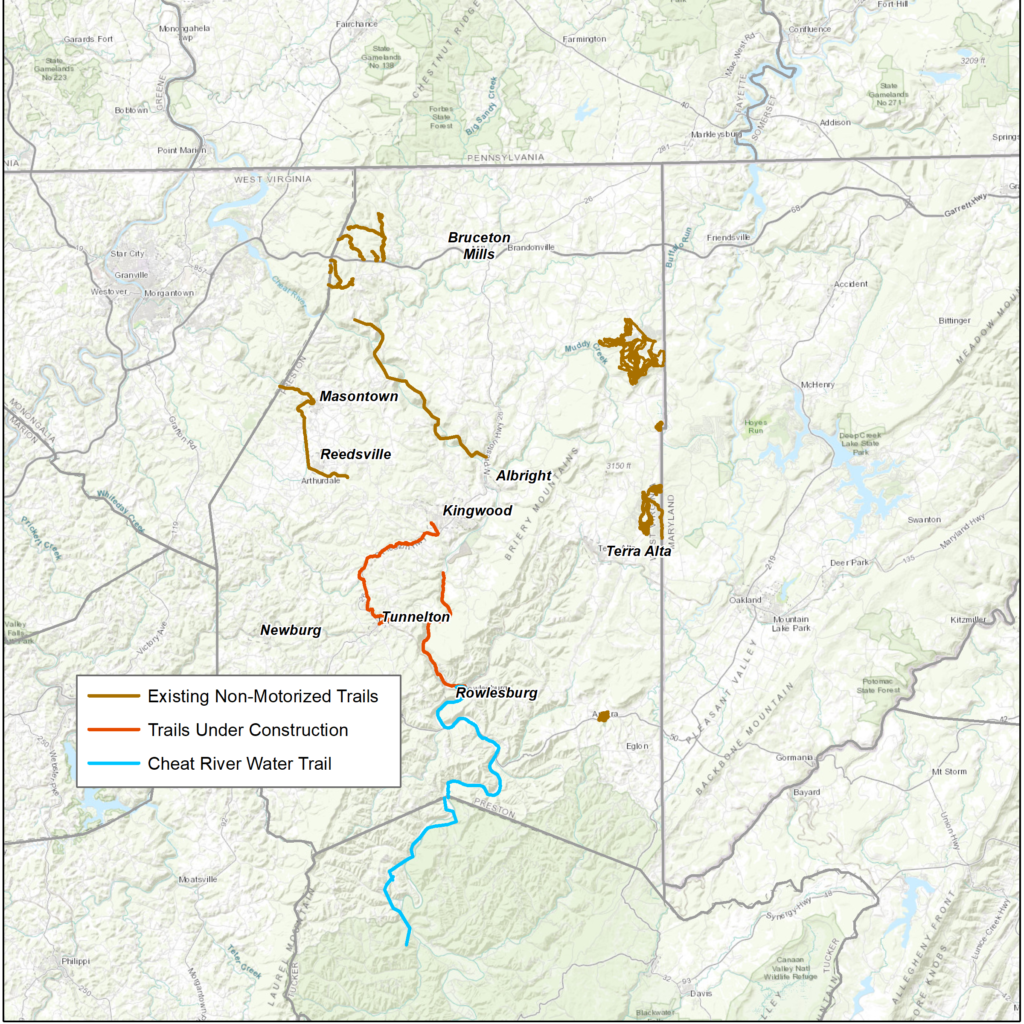MORGANTOWN — Preston County’s natural beauty and ever-growing network of trails make it a prime tourist draw, but the county lacks the services – lodging, eateries, vendors – to draw tourists to the trails.
A look at what’s lacking and a vision help Preston realize its potential is presented in a plan put together by Friends of the Cheat, Downstream Strategies and the Preston County Parks and Recreation Commission called “Mountaineer Trail Network: Preston County Master Trail Plan.”
The 101-page plan, the authors say, serves not only as a vision for Preston, but as a model for all 15 counties in the network to expand their potential.
“As more and more people rediscover the Cheat,” FOC Executive Director Amanda Pitzer says in the plan, “visitors and locals alike are hungry for opportunities to explore Preston County by foot, boat and bike. This has fueled a major wave of trail development across the county.” By 2022, 18 miles of new trail will join the existing sections and bikers will be able to ride from Preston to Ohio and Washington, D.C.
But, the plan says, “much of our trail and tourism development has been piecemeal, with counties working independently … with a scarcity mindset,” competing for a supposedly limited number of visitors.
The Mountaineer Trail Network is aimed at overcoming that mindset and uniting the 15 counties in a regional vision focused on drawing mountain bikers. The trails aren’t all physically connected, the plan says, but a united vision can benefit all under a single regional brand.
The trail network was created by legislation passed in 2019 then expanded and tweaked in 2020. the 15 counties united under the Mountaineer Trail Network Authority span from Wood in the West to Mineral and Grant in the east and include Preston, Monongalia and Marion.
The network authority – a governing board that will include representatives from all 15 counties when it is complete – will establish quality standards for the trails to be included in the network, coordinate branding and provide landowner liability protections to encourage landowners to allow mountain bikers access to their land.
In Preston, more than 86,000 acres of potential recreation land is privately owned. The network will allow landowners to set the terms for access to their property and the types of recreation allowed.
The plan is focused on mountain bikers, it says, because of the economics. Mountain bikers travel specifically to go biking and spend money on lodging, food and more. Tucker County host a number of annual bike events that generated $294,000 for just six days’ worth of events.

Preston County
Preston County has 137 miles of non-motorized trails, with 98.5 being land based and 38.5 being the Upper Cheat River Water Trail. Biking is allowed on 89.5 miles of the trails. Among the land trails are the Big Bear Lake system, Alpine Lake, a portion of the Allegheny Trail, the Coopers Rock trails, the Deckers Creek Rail-Trail and the West Virginia Northern Rail-Trail. The new Cheat River Rail-Trail is expected to begin construction next year.
Tourism in Preston County, the plan says, currently accounts for $32.4 million per year in direct spending. But more is needed to draw mountain bikers.
Most lodging is traveler focused, it says – geared to people passing through to somewhere else – not tourist focused. More lodging of all types – hotels and motels, camping and short-term rentals are needed to handle an increased tourist load.
Preston has restaurants but they’re far from the trails and unlikely to co-market with the trails. Preston has few shops to serve outdoor recreation markets; the closest gear stores and bike shops are in Morgantown and Oakland, Md.
“Given the relatively few existing options for lodging or dining within easy access to the trails, there is tremendous opportunity for expansion in these areas,” the plan says. That includes food trucks, which are cheaper than fixed sites and can target prime sites during events or weekends.
The Preston Trail Towns Program was created in 2019 to begin to address the needs and opportunities. Rowlesburg, Albright, Kingwood and Tunnelton are all engaged.
:Strategically, Preston Trail Towns focuses on Trail Town livability and design as a springboard toward developing appropriate tourism infrastructure,” the plan says.
Delegate Evan Hansen, D-Monongalia, played a lead role in the 2020 legislation to expand and refine the Mountaineer Trail Network. He also is a principal of Downstream Strategies, which put together the plan.
Asked how it can serve as a model for 14 more plans, he said, “We think it’s a model because all 15 counties could benefit from a similar county-level plan. Outreach is continuing with the 15 counties, now that the Preston County plan is completed.”
Right now though, he said, though, they don’t have funding to produce more plans.
“Several counties have appointed board members to the authority, but several haven’t yet,” he said. “I’d like to see counties continue to appoint members, and then for the authority to finally meet to start organizing itself and to take actions to develop and market the Mountaineer Trail Network.”
Delegate Gary Howell, R-Mineral, played a lead role in expanding the original 2019 bill that included just five north-central counties to 12 counties (three more were added in 2020).
The network can link Pittsburgh to D.C., Cumberland, Md. And the Eastern Panhandle, he said. Mountain bikers will be able to make a loop.
As the network evolves, entrepreneurs will see the service gaps and aim to put businesses there, he said. “I think that’s what you’ll see develop.”
Tweet David Beard@dbeardtdp Email dbeard@dominionpost.com




